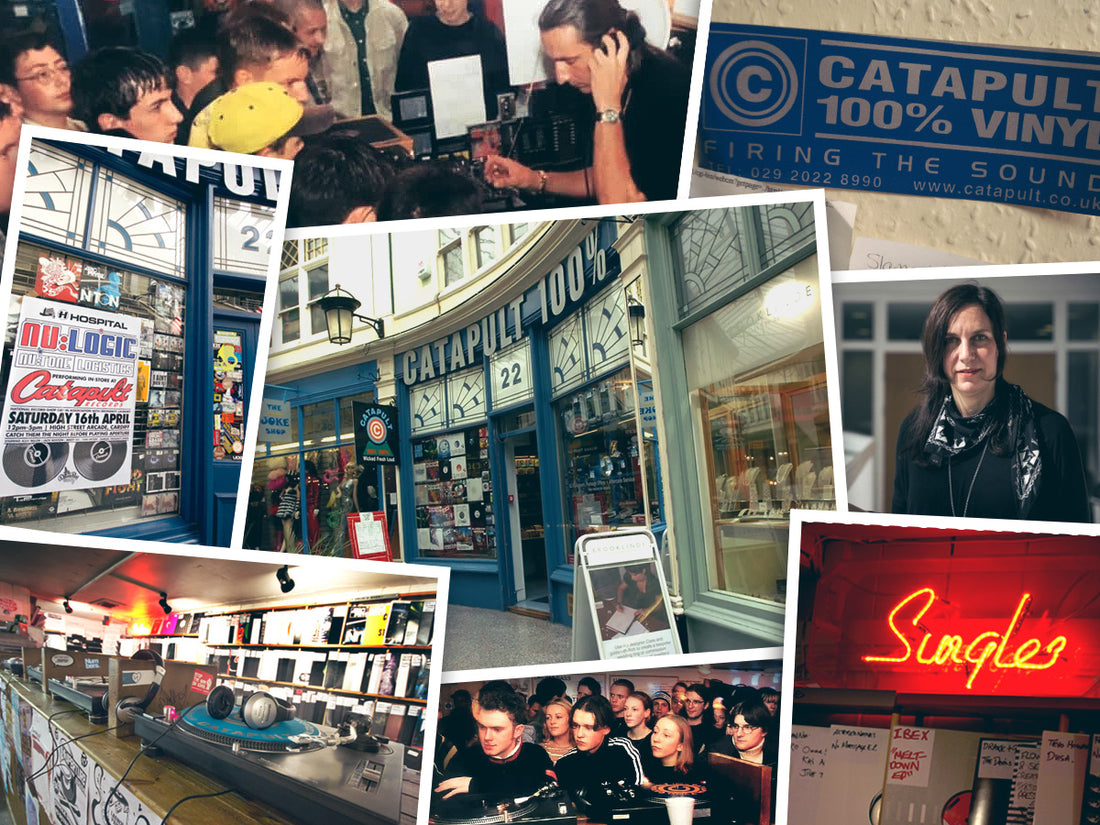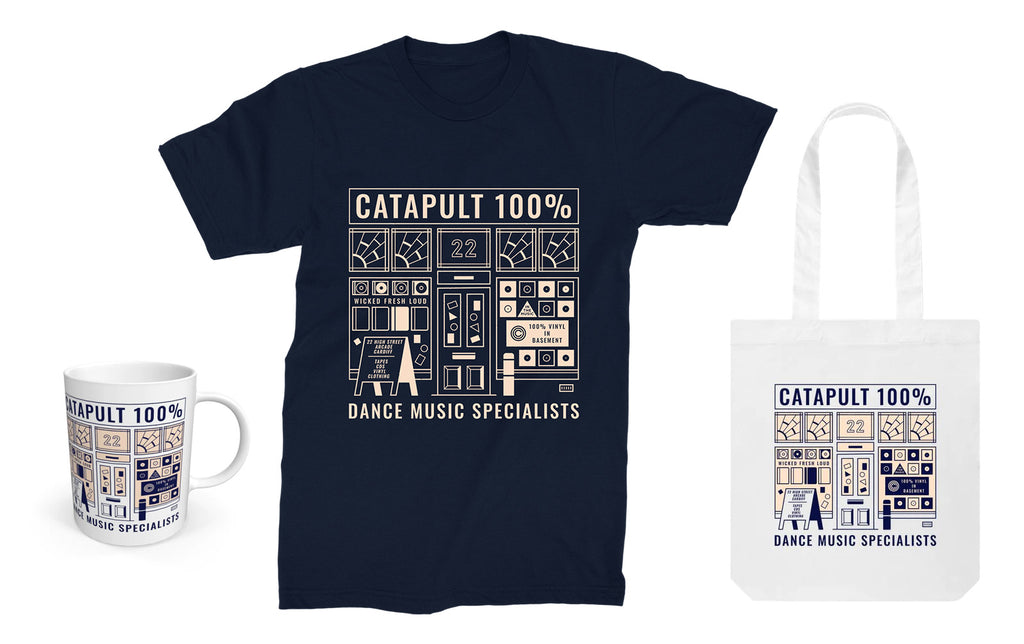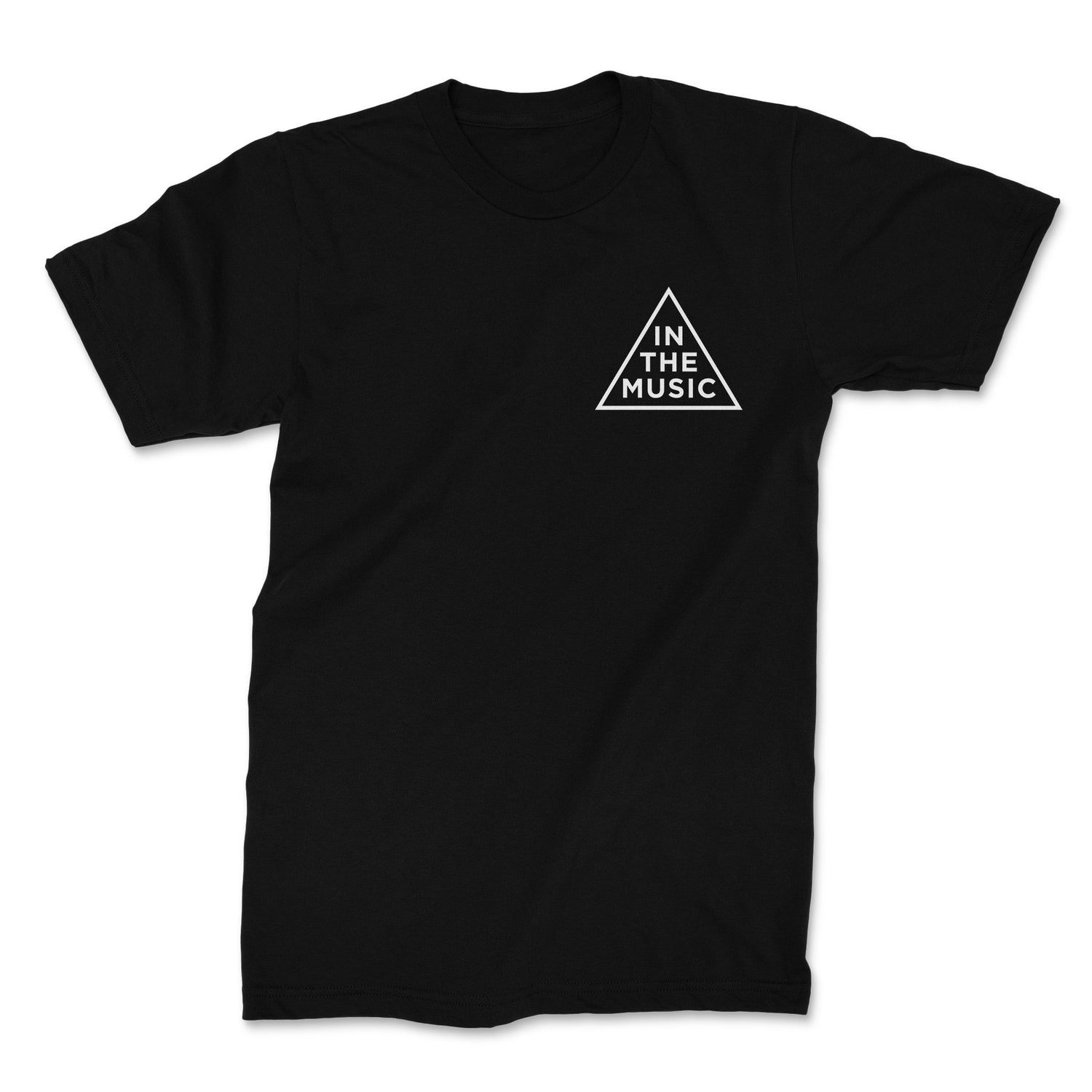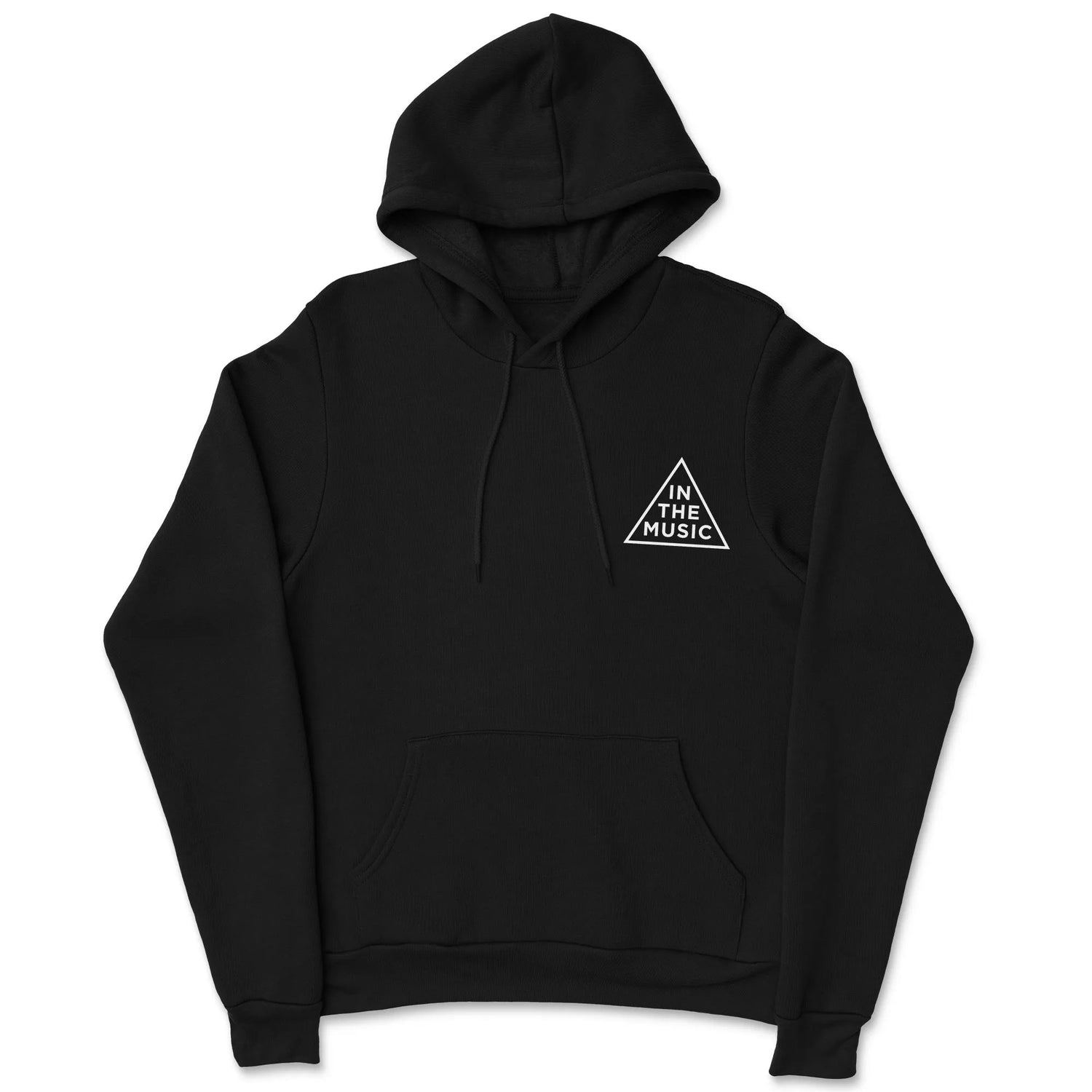There was a time not so long ago when if you wanted to buy new tunes for DJing you had to go to a record shop. “No shit, Sherlock” I hear you say. It may be hard to imagine in today’s hyper-connected digital world that before lossless formats and digital DJ equipment, before the rise of online retail, you could only get your music for DJing on vinyl and in person. You might argue it’s progress that you can hear a track in a club or festival, fire up Shazam and download or stream it seconds later.
Look, I’m not here to discuss formats or bemoan modern life (well, maybe a bit of the latter, it’s a hobby of mine as I enter middle age). I’m here to delve into the role of the record shop as a cultural hub, community base and lifeline for dance music. If you land in any town or city, the local record shop should be the first place to find if you want to know what’s going on and what makes the place tick. Some years ago I landed in Cardiff, bought some decks shortly afterwards, and found Catapult 100% Vinyl.
Catapult’s history goes back to founder Lucy Squire’s car boot then a small unit in Castle Arcade in 1993, but I’m thinking back to the iconic front of 22 High Street Arcade in its heyday. After wandering in past the rows of tapes, posters and listings for forthcoming local events, a cheery hello from whoever was working on the ground floor on the way through to the stairs, then down to the basement. Rows of 12”s in their cardboard sleeves presented on the walls, listening posts dotted around the room (each with its own Technics 1210 and headphones so you could try before you buy), latest releases, white labels, staff picks.
You’d get to know the people on each section, every one of them an enthusiast, music lover, specialist. They genuinely helped me as a DJ, and when I started promoting events Catapult was part of that journey too. I used to go in at least once a week, but there was a phase when I worked in town and went every weekday on my lunchbreak. There was a proper community feel to the place – Catapult was like a web that touched every part of independent, alternative dance music in the city and surrounding area. Lifelong friendships were forged. It brings a wave of nostalgia when I flick through my record collection and see a £5.99 Catapult sticker on a sleeve. Every house move has relied on Catapult carrier bags to transfer my stacks of vinyl.
The list of names that made in-store appearances would make a decent festival. There were Catapult events, clothing (‘Youth of Britain’), record bags, DJ school, and even a successful, sold out series of releases from an in-house label. This certainly wasn’t just a shop.
Music may be more accessible than ever, but without the connection to people and experience, it loses its soul. No algorithm can replace it. Cardiff still lays claim to the oldest record shop in the world in Spillers (and long may they continue), but would Cardiff be on the international map for drum’n’bass if it wasn’t for Catapult? Probably not. And more importantly, would In The Music exist if wasn’t for the connections that happened through Catapult? Almost certainly not. Matt started as a freelance designer for Catapult and became part of the extended family. This led to meeting Dave and the Cool House crew and doing design work for them, and so on and so forth.
We’re very pleased to have some words direct from the source, Catapult’s journey was quite a ride! Here’s Lucy Squire on gabba, human algorithms and exploding pens:
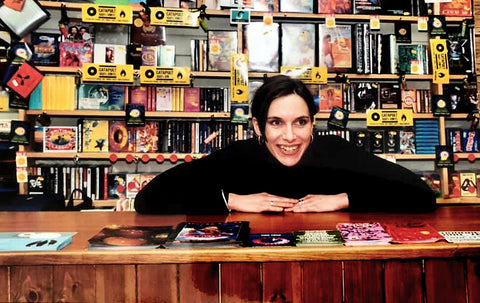
What did Catapult mean to you, and the impact it’s had on your life?
First of all, thank you to In The Music for this special acknowledgement. Catapult Records started life from my car boot in 1993 and grew organically from there. No way could I imagine this lifestyle choice would develop into a fully-fledged business, winning awards and consuming my world for the next 21 years.
I felt lucky to be the master of my own destiny and proud of Catapult’s place in the city from a community perspective. Our ethos was never to specialise in any one genre, in favour of representing all forms of electronic music from gabba techno right through to experimental ambient; this approach brought many experiences with it along the way. Impact-wise, I enjoy my music knowledge and the memories of all the artists I've met, but mostly it's the connections with the people that were there at the time that joys and endures.
What did Catapult teach you about music’s role in a city’s sense of identity?
A broad customer base travelled from far and wide in search of specialist dance music; there was community support, and this was never stronger that on the days we held in-stores (my favourite thing to do at work). Bonobo, Drop Music, High Contrast, Vibes, Blame, Netsky, Nic Fancilliu, LTJ Bukem all visited, and this meant so much to the local scene, particularly as not every artist wanted to cross the bridge and support shows in Wales. At first, I couldn't see how it was going to work in my small shop, outside a club environment (I was really worried about the crowds), but then I experienced the most unique, intimate sets: a real sense of being in the present with a small collective of hardcore enthusiasts. Music translates very differently in different spaces and anyone who attended knows how special those gigs in a small basement in Cardiff were.
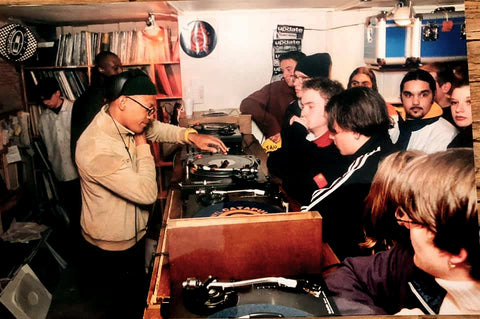
Day-to-day, much of our trade came from regulars who influenced what we stocked and utilised Catapult as a base to network, socialise and promote projects. We bought plants and benches to facilitate the social vibe and often people would hang out for the day. We stocked products from the community feeding into the independent cultural economy and started a Catapult label to represent local talent - record shops definitely have the ability to put a destination on the map. It was a significant moment for Cardiff when the Organ Grinder got booked for Berghein, Berlin.
The cultural times are also relevant, especially the DIY ethos of the 1990s where people were getting together and doing innovative things. I often explain Catapult as a human algorithm and reflect on selling tunes by playing them down the phone to customers all over the UK. Every record shop is unique and a reflection of the city in which it is based.
What do you miss most about Catapult?
Cally and Raeph's trips back from the Joke Shop next door with exploding pens. The team spirit and continuous laughs - it always felt like a good place to be.
There were ten people servicing the Catapult counters at its peak, crawling over one another grabbing stock in a confined space which often felt like a big game of Twister. I spent A LOT of time with the individuals that worked there and wouldn't have been able to achieve half the things we did without a great team.
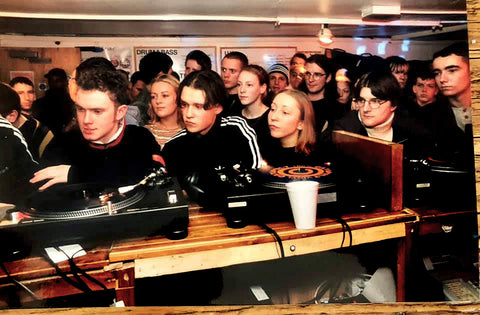
There’s been a whole heap of success stories from Catapult employees: most notably Drum & Bass legend High Contrast. Then there's Raeph Powell and Richie Vibe Vee at 1Xtra/BBC, Cally with a glittering international DJ/production career, entrepreneur Neil Cocker, journalist Adam Corner, DJ and graphic designer Stu Grady, Helia Phoenix who runs We Are Cardiff, Tyrone and Rick who still play for Time Flies, and general legend and top birder Mat Meehan. A special shoutout to the Catapult girls Josey, Mel & Phoenix, along with Simon, who joined the crew in 2003; all complete legends and integral to Catapult's success. Record shops are a great place to discover new music and people - Spotify, YouTube, and Amazon can’t create this kind of community.
What do people getting into DJing and clubbing today do to create the sense of community that sprung from having a place to go, a hub, like Catapult?
Connect with like-minded people, build a regular night or attend one. There's plenty of venues around Cardiff that support artists and promoters such as Paradise Garden, Porters and the Moon. What’s different these days are the third sector organisations run by dedicated people to support the music industry in Wales, such as BBC Horizons, Beacons, Radio Plattform, Tŷ Cerdd, Anthem and Sound Progression - all 100% community orientated.
Hot in the news this week is that the "Number of independent record shops in UK hits 10-year high"... maybe the time is right for a new Dance Music store in town?
So here we are, around 9 years after Catapult’s doors shut for the final time on New Year’s Eve 2014, In The Music is proud to commemorate a true legend of the city of Cardiff in t-shirt form.
- Words by Doug Nicholls
- While the shop may have closed its doors, the conversation remains at Catapult Facebook page
- Photos for the article were sourced from Catapult's Facebook group

